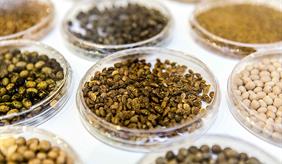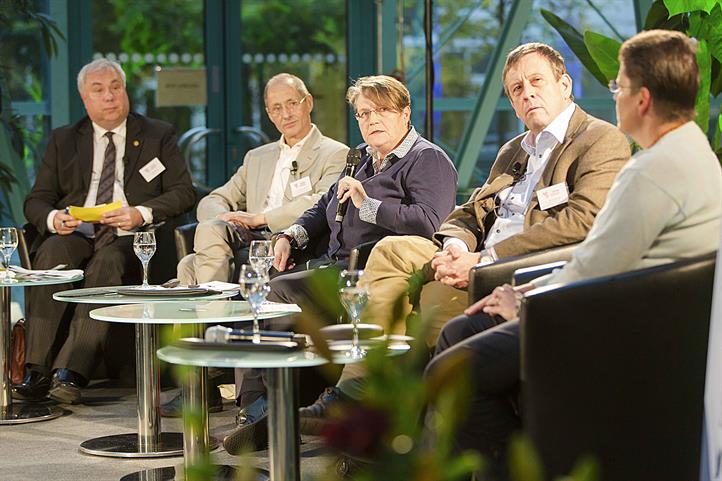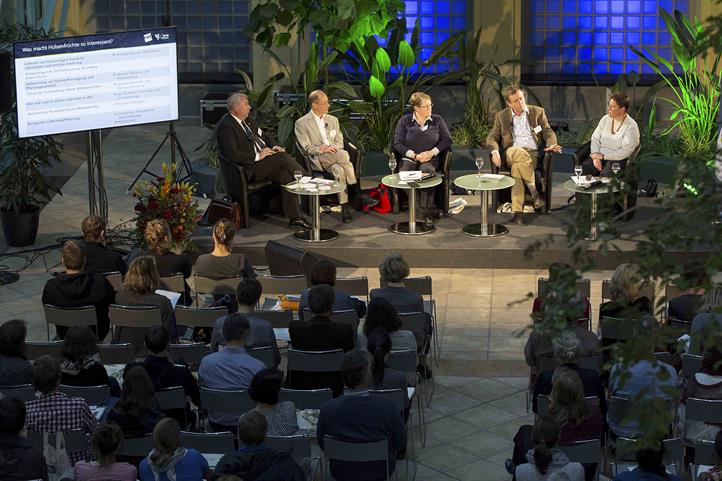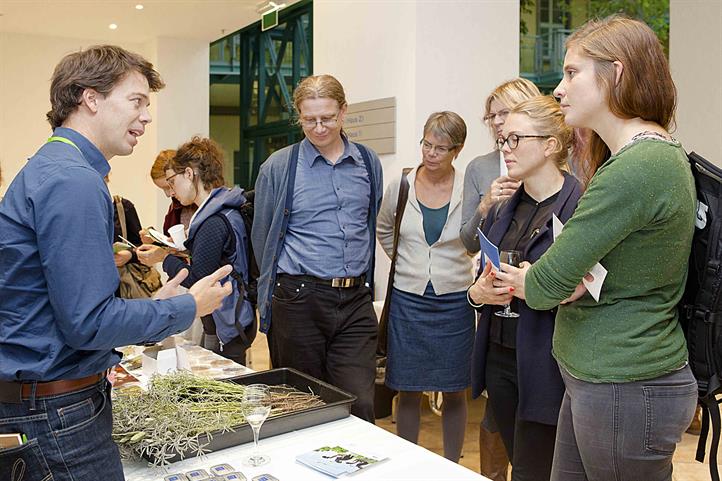Press Release

The Leibniz Centre for Agricultural Landscape Research (ZALF) e.V. held an interactive panel discussion on the 28. October 2016 at the house of the Leibniz Association in Berlin under the motto “Legumes – An Old Crop with a Big Future.” Featured speakers – scientists from four Leibniz Centres and with diverse disciplines – addressed the matter of Legumes from multiple standpoints. In addition to topics concerning genetics, cultivation and animal feed, issues regarding nutrition took centre stage. Over 75 attentive audience members followed the discussion and actively engaged in the debate through social media. Thus, a stimulated and candid dialog unfolded between academia and the public about the advantages and disadvantages of lupines, peas, beans and the like.
Besides sharing current challenges faced in research and professional practice, the four speakers provided insight for the future. Different responses to the question, “What role will legumes play on the world stage in 2030 and which contributions can and should your research provide?” were gathered:
Dr. Johann Bachinger, Leibniz Centre for Agricultural Landscape Research e.V.:
“My hopes are that Europe will produce more than 10 percent legumes, instead of scarcely 2 percent, and in particular an increase in cultivation of forage crops, so that we can dramatically expand our local milk production as well as improve the quality of our animal products. At ZALF, we are working intensively and very closely with agriculturalists on the issue of resource efficient land use systems from all different practical viewpoints. Under this pretext, a main focus is to increase farmers’ harvest with concrete and scientifically-based practice recommendations.”
Dr. Ulrike Lohwasser, Leibniz Institute of Plant Genetics and Crop Plant Research (IPK):
“I can imagine that the production of protein-packed plants for animal consumption and human nutrition will have intensified by 2030. At IPK, in addition to other issues, we would like to focus on contributions to finding selective seeding material with specific characteristics – such as disease resistance or yield increase – that would be useful for seed breeders.”
Dr. Cornelia Metges, Leibniz Institute for Farm Animal Biology (FBN):
“An ideal situation would be one in which the production of legumes in Germany would increase, there would be an expansion of legumes for animal consumption and an improvement of processing facilities so that we could enhance crop preparation for animal feed.”
Prof. Dr. Andreas F. H. Pfeiffer, German Institute of Human Nutrition Potsdam -Rehbrücke (DIfE):
“My hope for 2030: We have a wide range of food products that contain characteristics of legumes – in particular protein, fibre and polyphenols – so that people will eat more foods containing legumes rather than foods with animal proteins. Presently, our objective is to prove that this is also a healthy solution, for example in regards to diabetes, aging, muscle mass and bone structure.”
Lastly, an interactive exhibit inspired deeper reflection of issues and clarification of further questions, which were discussed over tastings of lupine ice cream. In addition to the Leibniz Centres participating on stage, Prolupin GmbH, the agrathaer GmbH, the Leibniz Institute of Vegetable and Ornamental Crops (IGZ) and the Leibniz Research Alliance “Sustainable Food Production and Healthy Nutrition” were represented at informational booths.
Background:
Legumes are cultivated on only 1.7% of agricultural land in all of Europe. Over 70% of plant-based protein in animal feed, particularly soy, is imported. Yet, lupine, peas and beans occupy only a small niche within the food industry. The plants provide high quality protein for our nutrition and increasingly more people are appreciating legumes as a feasible alternative to meat. Even in terms of animal feed, legumes can ensure greater sustainability, for example through cultivation on local agricultural land rather than dependence on imports. Thereby, legumes have a positive effect on the climate and ecosystem: through a symbiosis with bacteria, the plants sequester nitrogen from the air and fix it in the soil as a form of natural fertilizer. Moreover, legume cultivation reduces greenhouse gases, supports humus soil building, and increases the biological diversity of agricultural landscapes.
The United Nations declared 2016 as the year of Legumes with the aim to highlight the advantages of these crops. With this backdrop, the panel discussion provided a platform for dialogue among researchers, professionals and civil society and stimulated the opportunity for discussions, networking and entertainment.
 Press Release as PDF.
Press Release as PDF.
Pictures
For downloading the pictures please click on a picture and use the
 icon.
icon.

The Moderator Dr. Norbert Lossau (DIE WELT), Prof. Dr. Andreas F.H. Pfeiffer (DIfE), Dr. Ulrike Lohwasser (IPK), Dr. Johann Bachinger (ZALF), Dr. Cornelia C. Metges (FBN) (f.l.t.r.) | © Rico Prauss.

Over 75 engaged audience members attended in the house of the Leibniz Association | © Rico Prauss.

In addition to the panel discussion, a participatory exhibit provided further information about legumes and food product tastings such as lupine –ice cream and bread. Source | © Rico Prauss.
